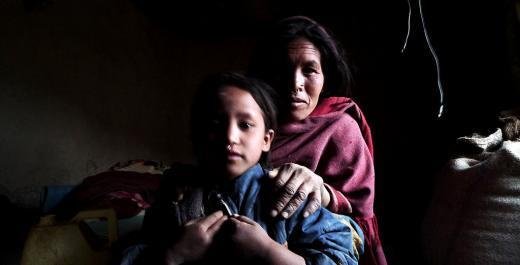SURKHET, Nepal (GPI)-- Kalu Saru, 39, repairs the earthen stove in her house in Surkhet, a district in western Nepal, while her husband, Dambar Saru, basks in the morning sun in their courtyard. Their two daughters, Bishnu, 20, and Roshni, 22, busy themselves around the house. The sounds of cattle, goats and roosters hang in the rural air.
“Even though I gave birth to two daughters, my family is happy and peaceful,” Saru says.
Nepalese culture makes sons a necessary part of the family. Parents rely on sons to support them financially when they grow old, to perform their funeral rites when they die and to inherit their property.
Saru gave birth to her first daughter two years after her arranged marriage to her husband. Two years later, she gave birth to another girl.
The couple knew they could support only two children, Saru says. So her husband obtained a vasectomy in 1994 instead of trying again for a boy or abandoning her for another woman who could give him a son.
“The happiest thing in my life is that my husband didn’t marry another woman even though I gave birth to girls only,” Saru says.
But six months later, his mother started nagging him that she needed a grandson, she says. Her husband finally told his parents, whom they were living with at the time, that they would not be having any more children.
“When the parents knew it, they considered their son as good as dead without any male inheritor,” she says.
Saru’s in-laws hold her responsible for not producing a son to perform the traditional Hindu funeral rites after a parent’s death, she says. Their neighbors also constantly humiliated her for giving birth to only girls. This finally forced them to move out of the parents’ house.
“We were compelled to live separately at a place five kilometers away,” Saru says.
This had financial repercussions on the young family.
“My husband’s teaching profession was not enough financially to support the upbringing of the two girls,” Saru says. “It was difficult to make both ends meet.”
The move also affected their daughters’ education.
“We moved our daughters from the private school to the government one, where quality education was lacking,” Saru says.
But now, their daughters are doing well in school, Saru says. Her daughters say their parents’ love counts more than society’s views.
“Whatever our relatives and the society may comment, we sisters are loved as sons by our parents,” says Roshni Saru, who is pursuing her bachelor’s degree.
Kalu Saru is also working to change the culture locally as a member of Santoshi Pariwar Samaj, Nepal’s lone organization of mothers with only daughters who advocate against discrimination in society.
Nepalese parents depend on sons to carry out various cultural practices, so women who give birth to only daughters face abandonment by their husbands, relatives and society. Santoshi Pariwar Samaj is the only nongovernmental organization in Nepal that unites mothers of daughters.















